|
|
|
Sort Order |
|
|
|
Items / Page
|
|
|
|
|
|
|
| Srl | Item |
| 1 |
ID:
090673
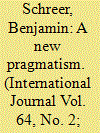

|
|
|
|
|
| Publication |
2009.
|
| Summary/Abstract |
The analysis here examines the major factors leading to a change in Germany's approach towards the alliance. It proceeds in three broad steps. First, evidence for a shift in German NATO policy is provided. Second, the most important external and domestic factors affecting German behaviour in NATO are identified. In the final section, some predictions for future German NATO policy are made, as well as some implications for the alliance as a whole.
|
|
|
|
|
|
|
|
|
|
|
|
|
|
|
|
| 2 |
ID:
172090
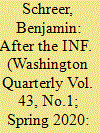

|
|
|
| 3 |
ID:
081385
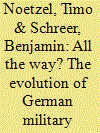

|
|
|
|
|
| Publication |
2008.
|
| Summary/Abstract |
German strategic decision-makers have to reconsider their approach to the use of force. In Afghanistan, the Bundeswehr is faced with the challenge of a growing insurgency. This situation requires a willingness to provide combat forces for the NATO-led International Security Assistance Force. Hence, the conviction in German domestic politics that the Bundeswehr should only be employed for the purposes of stabilization and reconstruction is increasingly challenged by a changing operational reality in Afghanistan, and allies' reluctance to continue to accept German policy. In essence, the issue is about German participation in counterinsurgency operations. To continue current policy undermines Germany's military credibility among allied partners and restrains Germany's ability to utilize fully military power as an instrument of policy. This article argues that while military force in recent years has become an integral part of German foreign policy to pursue national interests, political decision-makers in Berlin and the broader German public will still have to come to terms with the reality of a new security environment in Afghanistan. For the German government the 'small war' in northern Afghanistan is a very politically exhausting undertaking. Both politically and militarily Germany seems ill-prepared to sustain such an operation. Its political and strategic culture still promotes an aversion to involvement in war-fighting. In addition, the government and the Bundeswehr lack vital strategy-making capabilities. Still, there are indicators that the changing operational reality in Afghanistan might lead to a significant evolution of the German approach to the use of force
|
|
|
|
|
|
|
|
|
|
|
|
|
|
|
|
| 4 |
ID:
143910
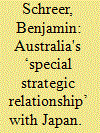

|
|
|
|
|
| Summary/Abstract |
In July 2014, Australia's new Prime Minister, Tony Abbott, and his Japanese counterpart, Shinzō Abe, elevated the status of bilateral ties to a ‘special strategic relationship'. Both sides also agreed on intensifying their defence technology cooperation, including in the submarine space. As well, Prime Minister Abbott called Australia a ‘strong ally’ of Japan. Yet, the prospect of a further strengthening of Australia–Japan defence relations has led to criticism by Australian strategic commentators. In particular, critics argue that closer strategic relations with Japan could damage Australia's ties with a rising China. In a worst-case scenario, Australia might even become ‘entrapped’ in a Sino-Japanese conflict. However, this argues that a closer defence relationship is in Australia's strategic interests in the face of China's increasing challenge to the rules-based order in the region. China's uncompromising position in the South China Sea and its more assertive behaviour have led to a greater congruence of threat and risk assessment between Australia and Japan. Indeed, Australia and Japan are increasingly facing a security dilemma vis-à-vis China, albeit to varying degrees. Therefore, for Australia, promoting Japan's ‘security normalisation’ contributes to regional stability. As well, the article points out that closer strategic ties with Japan do not automatically come at the expense of Sino-Australia relations. China's leverage to ‘punish’ Australia for unwanted strategic behaviour is limited, and concerns about ‘entrapment’ in a Sino-Japanese war are exaggerated. However, the more China exerts coercive diplomacy, the closer Australia–Japan defence relations are likely to become.
|
|
|
|
|
|
|
|
|
|
|
|
|
|
|
|
| 5 |
ID:
161323
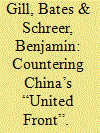

|
|
|
| 6 |
ID:
094064


|
|
|
|
|
| Publication |
2010.
|
| Summary/Abstract |
NATO has a panoply of legacy partnership programmes, which should be reviewed as part of the development of a new Strategic Concept. Stephan Fruhling and Benjamin Schreer argue that NATO should conceive of its partnerships in terms of the provision of public security goods, and base its activities on a more explicit consideration of the Alliance's strategic interests. In combination, both aspects can achieve consensus about goals and means, provide greater coherence, and better communicate NATO's activities and intentions.
|
|
|
|
|
|
|
|
|
|
|
|
|
|
|
|
| 7 |
ID:
086945
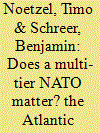

|
|
|
|
|
| Publication |
2009.
|
| Summary/Abstract |
This year NATO will celebrate its 60th anniversary. So far the world's most powerful military alliance has been a remarkable success story. However, as the first decade of the new century draws to a close there appears to be a widening strategic rift among the allies. 'Two-tier NATO' is by now an established piece of shorthand in international strategic debate to indicate an 'alliance à la carte' divided into two or more factions of member states with divergent interests. Evidently, the alliance increasingly struggles to reach consensus on a whole range of strategic issues. So is NATO on a path to disintegration and, ultimately, to failure? This article argues that the organization has developed from a fixed 'two-tier' into a rather fluid 'multi-tier' alliance. On many issues the alliance is in fact divided into several different camps that are pushing in different directions. Thus, allies can be grouped into one of three tiers: a 'reformist', a 'status-quo' and a 'reversal'-oriented one. While the evolution of such a multi-tier alliance will not inevitably result in NATO's demise unmanaged, this manifestation of camps will continuously disrupt the organization's strategic agility. The article finds that if NATO is to maintain strategic vitality, it needs to develop new institutional mechanisms and establish a consensus on its strategic posture in the changing international order and to make 'variable geometry' work.
|
|
|
|
|
|
|
|
|
|
|
|
|
|
|
|
| 8 |
ID:
184985
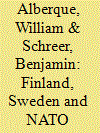

|
|
|
|
|
| Summary/Abstract |
Russia’s war against Ukraine has suddenly made NATO membership for Finland and Sweden highly likely. It would end their long-standing postures of ‘armed neutrality’. Their accession would constitute a major shift in European security. Properly managed, it could produce a net benefit. Both nations would be security providers, with highly capable forces. They would make significant contributions to burden-sharing among the allies and enhance NATO’s ability to modernise its defence planning and capability development. Their membership would also bolster NATO deterrence by complicating Russian military planning in the geostrategically evolving Baltic Sea region. Dealing with Russia in that region, the Arctic and the High North would also become more central to NATO’s strategy and posture.
|
|
|
|
|
|
|
|
|
|
|
|
|
|
|
|
| 9 |
ID:
188352
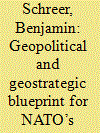

|
|
|
|
|
| Summary/Abstract |
How will the North Atlantic Treaty Organization (NATO) respond to China’s rise? At the heart of NATO’s China challenge is the need for allies to grasp the magnitude of Beijing’s emerging geopolitical challenge to the Euro-Atlantic area. Utilizing geopolitical theories developed by Halford Mackinder and Nicholas Spykman, the article argues that China is evolving into a transatlantic challenge on the Eurasian “maritime periphery.” Consequently, NATO can play a significant role in putting pressure on China’s continental direction and its efforts to extend its strategic reach into the “far seas.”
|
|
|
|
|
|
|
|
|
|
|
|
|
|
|
|
| 10 |
ID:
102407
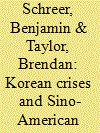

|
|
|
|
|
| Publication |
2011.
|
| Summary/Abstract |
For much of the past two decades, America's approach toward the Asia-Pacific has been seen by many as highly disjointed, the product either of strategic inattention or the push and pull of US domestic politics. Meanwhile, the rise of China has spawned a cottage industry asserting the existence of a carefully calibrated and highly calculated Chinese grand strategy for the Asian century. Rising China, according to this line, may be biding its time and hiding its capabilities, but it is ultimately bent upon displacing American power in Asia.
|
|
|
|
|
|
|
|
|
|
|
|
|
|
|
|
| 11 |
ID:
109961
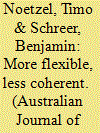

|
|
|
|
|
| Publication |
2012.
|
| Summary/Abstract |
At its 2010 Lisbon summit, the North Atlantic Treaty Organization (NATO) took significant steps towards becoming a modern alliance. In the face of a changing security environment and divergent strategic interests among 28 members, NATO adapted its strategic concept and reformed its way of formulating strategy. The new strategic concept advances conflict management as a core task for the alliance. In combination with a greater emphasis on developing partnerships, NATO conceptually strengthened its profile as a global security actor. The summit also reflected a new approach to formulating NATO strategy by providing the Secretary General Anders Fogh Rasmussen with a strong role in setting the strategic agenda. Indeed, he assumed a more supranational function rather than acting as a representative of all allies. But as the Libya operation demonstrates, NATO will struggle to maintain cohesion in an increasingly 'polycentric' alliance. While the focus on conflict management will make the alliance more flexible, it will also become a less coherent global security actor.
|
|
|
|
|
|
|
|
|
|
|
|
|
|
|
|
| 12 |
ID:
093085
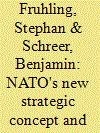

|
|
|
|
|
| Publication |
2009.
|
| Summary/Abstract |
The rise of China poses a great challenge for the transatlantic alliance. Although the common values that bind Europe and North America will not vanish, increasing demands on US resources from the Asia-Pacific region will erode the pre-eminence of the Atlantic alliance in American security policy. NATO must therefore adapt to the new reality by acknowledging the global nature of US commitments in its new Strategic Concept - and European powers must have a debate about the implications of East Asia for their own security.
|
|
|
|
|
|
|
|
|
|
|
|
|
|
|
|
| 13 |
ID:
096990


|
|
|
| 14 |
ID:
146357
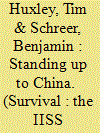

|
|
|
|
|
| Summary/Abstract |
During the course of 2015, China used land-reclamation techniques to expand many of the features that it occupies in the South China Sea, most of which were then militarised. This development – alongside many other important signs of assertiveness, including China’s large-scale naval modernisation; its expanding deployment of maritime paramilitary forces to coerce other Asian states, including Japan, in the East China Sea; its efforts to undermine the unity of the Association of Southeast Asian Nations (ASEAN); and its attempted creation of an alternative regional security architecture – not only indicated Beijing’s intent to reinforce its maritime claims, but also highlighted China’s drive to create a new regional order in which it plays a dominant and arbitrating role. Such an order could only undermine the interests of other regional states and the West. While the success of these efforts is by no means inevitable, the United States and its regional allies and security partners will need to respond more firmly to China, particularly in the South China Sea (SCS). By late October 2015, an initial ‘freedom of navigation’ patrol by the US Navy, which took one of its ships inside the 12-nautical-mile territorial waters claimed by China around one of the features that it occupies in the SCS, indicated that Washington recognised the necessity of stronger countermeasures. However, to succeed, this tougher approach will need to be both persistent and supported by US allies and security partners in the region and beyond.
|
|
|
|
|
|
|
|
|
|
|
|
|
|
|
|
| 15 |
ID:
120486
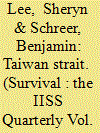

|
|
|
|
|
| Publication |
2013.
|
| Summary/Abstract |
The changing military balance, concerns about security guarantees and Taiwan's growing strategic importance make the strait one of the most dangerous flashpoints in Asia.
|
|
|
|
|
|
|
|
|
|
|
|
|
|
|
|
| 16 |
ID:
111915


|
|
|
|
|
| Publication |
2012.
|
| Summary/Abstract |
NATO's recent operation in Libya has been described by some commentators as reflecting a new burden-sharing model, with the US playing a more supportive role and European allies stepping up to provide the bulk of the air strikes. The US administration of President Barack Obama seemed to share this view and has made clear that post-Libya it continues to expect its allies to assume greater responsibility within the alliance. Moreover, unlike previously, changes within the US and the international system are likely to make America less willing and able to provide for the same degree of leadership in NATO that the alliance has been used to. However, this article finds that Operation Unified Protector in Libya has only limited utility as a benchmark for a sustainable burden-sharing model for the alliance. As a result, an ever more fragmented NATO is still in search for a new transatlantic consensus on how to distribute the burdens more equally among its members. While no new generic model is easily available, a move towards a 'post-American' alliance may provide the basis for a more equitable burden-sharing arrangement, one in which European allies assume a greater leadership role and are prepared to invest more in niche military capabilities.
|
|
|
|
|
|
|
|
|
|
|
|
|
|
|
|
| 17 |
ID:
164740
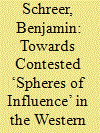

|
|
|
|
|
| Summary/Abstract |
The evolution of US-Sino great power competition in East Asia has emerged as a key geostrategic issue in international politics. A central question is whether the ‘geography of the peace’ will prevail where, despite their natural predisposition to compete for regional hegemony, the two great powers respect each other’s ‘spheres of influence’. This concept assumes that, as a major continental power, China remains preoccupied with securing its land borders and expanding its influence on the Eurasian land mass. In contrast, this article argues that the Sino-US rivalry likely leads to the emergence of a ‘geography of conflict’ in East Asia because of overlapping zones of strategic interests. Applying a classical geopolitics approach, it shows that the geopolitical models of British geographer Sir Halford Mackinder, US naval strategist Alfred Thayer and Dutch-American geostrategist Nicholas Spykman are useful to explain the current behaviour of China and the United States, and why, as a result, East Asia is becoming more contested.
|
|
|
|
|
|
|
|
|
|
|
|
|
|
|
|
| 18 |
ID:
165387
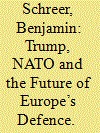

|
|
|
|
|
| Summary/Abstract |
Given US President Donald Trump’s uncertain commitment to Europe’s defence, calls for greater European strategic autonomy have grown louder. However, Benjamin Shreer argues that while the approach of Trump’s government is certainly complicating transatlantic security relations, the current arrangement for Europe’s defence – anchored on NATO for collective defence and complemented by EU military capabilities for limited out-of-area operations – is unlikely to change. A US withdrawal from NATO is equally doubtful, as is the prospect that European countries will become serious about developing strategic autonomy.
|
|
|
|
|
|
|
|
|
|
|
|
|
|
|
|
| 19 |
ID:
153359
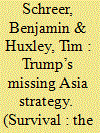

|
|
|
|
|
| Summary/Abstract |
The Trump administration needs an Asia strategy that will reassure its allies and partners there about Washington’s capacity, competence and resolve to retain its position of leadership in the region. Despite early visits by Vice President Mike Pence, Secretary of State Rex Tillerson and Defense Secretary James Mattis to reaffirm America’s ‘ironclad’ commitment to allies such as Japan and South Korea, mixed messaging and Donald Trump’s ‘America First’ doctrine – which apparently remains the administration’s default strategic concept – have continued to generate scepticism and anxiety.
|
|
|
|
|
|
|
|
|
|
|
|
|
|
|
|
| 20 |
ID:
188457
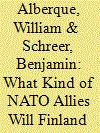

|
|
|
|
|
| Summary/Abstract |
Barring a Turkish veto, Finland and Sweden will join NATO as full members prior to the Alliance’s Vilnius Summit in June 2023. Both confront several political, military and defence-industrial choices regarding their membership, with different benefits and opportunity costs for each country and the Alliance depending on whether they select a low, medium or high level of ambition. Both are likely to adopt a medium level of ambition, opening up a range of new areas for cooperation with other allies and strengthening the Alliance as a whole. A high level of ambition is not likely in the short term, given the substantial political, financial and personnel costs it would entail. Nevertheless, it could eventually materialise.
|
|
|
|
|
|
|
|
|
|
|
|
|
|
|
|
|
|
|
|
|